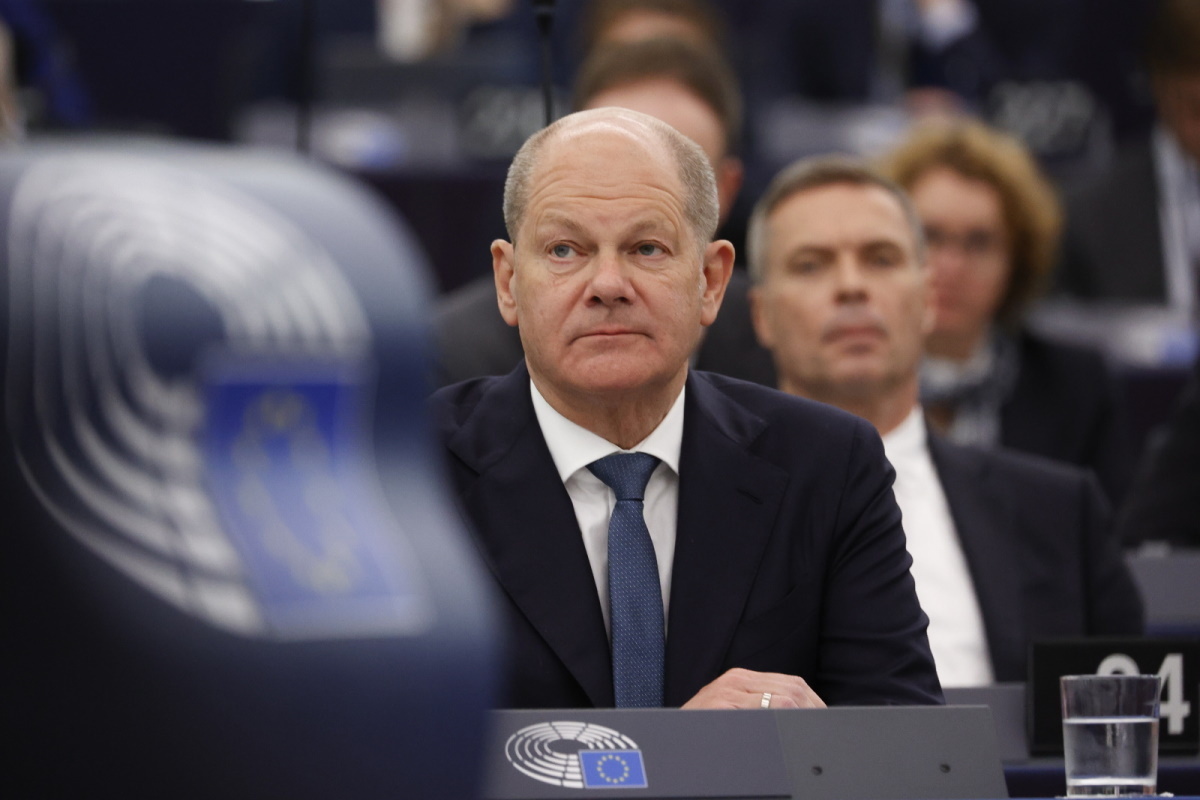On May 9, on Europe Day, German Chancellor Olaf Scholz delivered his vision of the future of the EU to the European Parliament. It is significant that on a day when we remember this historic moment made the declaration Robert Schuman – one of the founders of the European Union, today the altar candidate – the chancellor of Germany, who is known to want to subordinate the Community to the interests of Germany, spoke about the future of the EU. In his speech, he spoke of the fact that the Union must be united in diversity, but at the same time he stressed that its future lay in greater unification, namely progressive federalization under German hegemony. So what should the EU be like according to Scholz? With institutions taking on competencies that are not theirs, losing unanimity on key issues such as foreign policy, security and taxes, and climate neutrality.
What we hear from the German Chancellor in the EP is not surprising. On key issues, he presented the same position that we know from his lectures at Charles University in Prague. His speech brought nothing new to the debate on EU reform.
Scholz probably didn’t expect his speech to be criticized by lawmakers from almost all political factions, especially German politicians, including the head of the EPP, Manfred Weber, who simply said that “we don’t need any more policy speeches.” Terry Reintke, co-chair of European Greens, which in Germany formed a coalition with the SPD, took Scholz’s words even more bluntly. “Your image as chancellor proposing solutions has unfortunately faded in recent months,” said the German politician.
So, according to Scholz, the future of the EU is its progressive federalization, and even if these words are not taken literally, how else can we make sense of the assertion that the more united the EU, the better the future? Unity in Scholz’s vision is to be reformed, led by its EU agency, namely the EP, but especially the European Commission. In this context, Scholz called for the KPK to be equipped with stronger tools to apply violation procedures when the rule of law and democratic values are violated. He did not add who would judge this state of affairs. Looking at the EC’s current practice against Poland and Hungary, it is clear that the EC often uses this tool as a form of pressure on democratically elected governments, and its actions have nothing to do with the rule of law. Likewise with the CJEU legal case. Despite this, Scholz wants to increase the power of the European Commission and has announced that he will fight for it.
The Scholz Guild is also a Guild that speaks with one voice. What does this mean in practice? A departure from unanimity on matters that really matter to the EU. Scholz lists here foreign, security, and taxation policies. The foreign policy pursued by Germany was brutally demonstrated by the outbreak of war in Ukraine and the energy crisis facing the entire EU. The policy of making the EU’s energy dependent on supplies of raw materials from Russia has become a symbol of Berlin’s policy of submission to Moscow. Ironically, however, as Scholz tries to argue, walking away from unanimity should better protect the interests of member states. Following this line of thinking, member states would remove the veto power, and thus the safety valve to protect their vital interests, and in return they would have to rely on majority coalition building, and if this failed, they would. actually in German hands.
Scholz also called for the adoption of a new asylum policy before the next EP election, and pointed out that the EU should move towards a climate neutral Europe, setting an example to the world.
However, it should be noted that some of his words spoken in Strasbourg sound at least strange when compared with the facts. Among other things, Scholz said that the EU reacted in unity and solidarity to the outbreak of war in Ukraine. We all remember that it was none other than Scholz who torpedoed all kinds of EU decisions when it came to helping Ukraine, the famous symbol being the transfer of 5,000. old german helmet. It took Prime Minister Mateusz Morawiecki’s visit to shake Germany’s conscience, to realize that this was not the time for concrete egoism. It is also important to remember Germany’s resistance during the difficult process of negotiating the next package of EU sanctions imposed on Russia, or during the decision to send Leopard tanks. In this context, Scholz’s words about the EU’s united response to the war in Ukraine sound strange.
The concept of EU development presented by Scholz has been widely criticized, and thus Germany’s leadership in EU policy has been criticized, also for the lack of a quick response to the war in Ukraine, as well as its previous policy of closer relations with Russia. . Scholz’s leadership as chancellor of Germany was also undermined.
The pinnacle of insolence was also Scholz’s own Twitter entry, where he thanked that “78 years ago Germany and the world were liberated from the tyranny of National Socialism.” This is another example of German arrogance and arrogance, as well as an attempt to rewrite European history. First they said it was the Nazis who killed during World War II, not the Germans, and now the German Chancellor is thanking you for freeing him from the tyranny of National Socialism, which was born in Germany. This is another stage of shifting German responsibility for the outbreak and crimes of World War II, which they have yet to resolve, and have yet to pay Poland compensation. Unfortunately, we haven’t heard a word about this in Strasbourg.

“Reader. Future teen idol. Falls down a lot. Amateur communicator. Incurable student.”


![Bogusław Wołoszański: “Achieving nuclear weapons would be the beginning of World War III” [WYWIAD]](https://storage.googleapis.com/bieszczady/rzeszow24/articles/image/877236c0-66fd-457a-9eb4-41792f9077ff)




